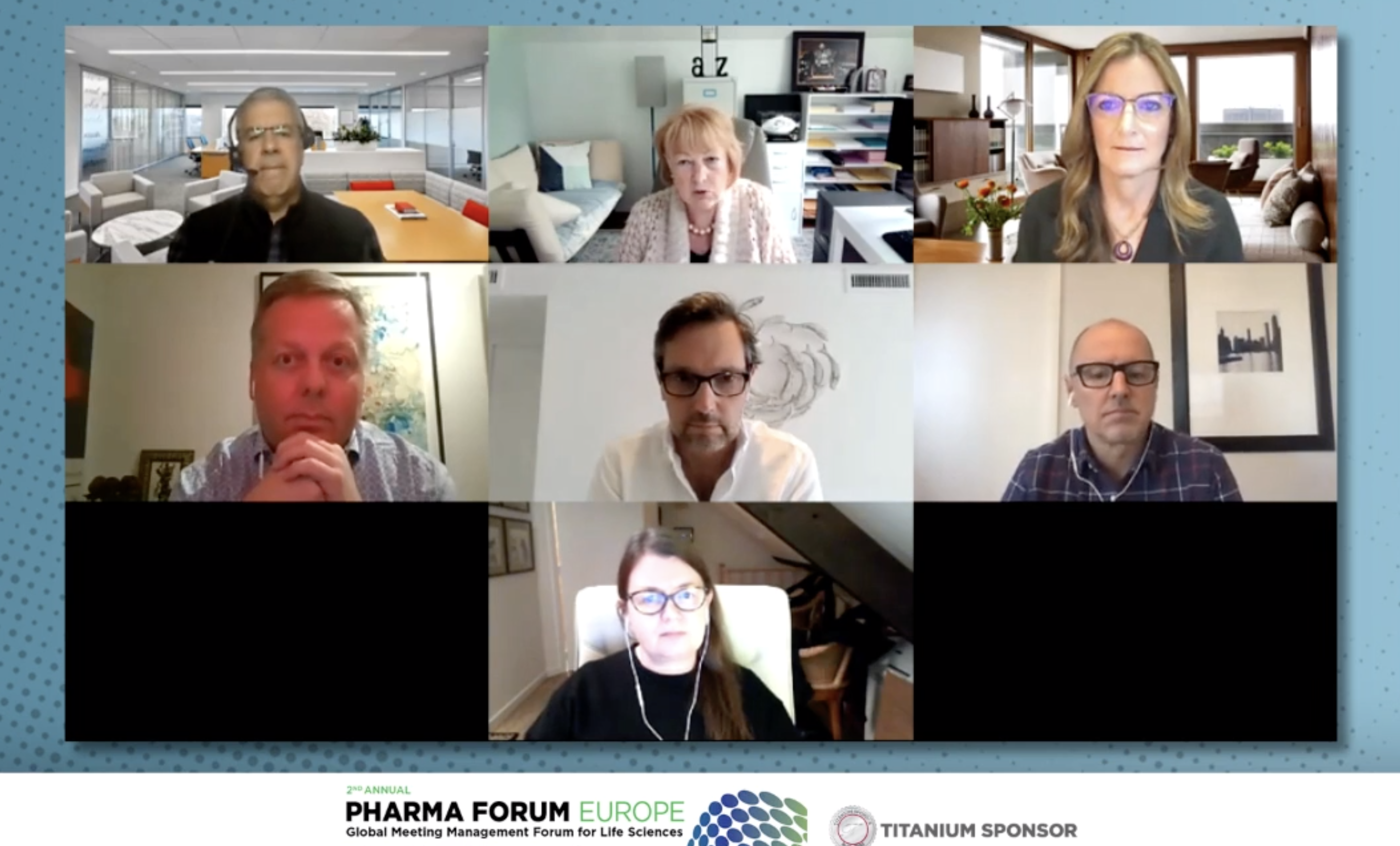In early December, more than 450 medical-event planners tuned into the virtual iteration of Pharma Forum Europe—including many who are based in North America. One of the sessions most highly rated by attendees was a 55-minute panel discussion titled “The Future of Medical-Meeting Transition” led by Pat Schaumann, HMCC, director of life-science development, meetings management, for McVeigh Global Meetings & Events.
Schaumann kicked off the discussion by noting this: “The things that were most important to medical planners have changed so much since the pandemic began. While it’s certainly good news that attendance for virtual events is soaring, attendees can simply leave [sessions] if they lose interest. One doctor recently said to me, ‘I love virtual and I’m totally engaged because I don’t have to travel or be away from my practice. And when I’m in a ballroom where the speaker isn’t very relevant to me, it’s hard to escape. But not with an online event.’” The lesson: “Immersive and engaging online sessions are critical, and the tools and approaches for doing that are different than in-person approaches.”
Also in the session, six meetings-management and regulatory experts provided detailed perspectives on pressing topics facing medical-event planners in this unusual environment. Here are the highlights:
On what else the pandemic has taught us about virtual event strategizing:
“We need to stop chasing fairy-tale deadlines; stand down from live events and wait until attendees are fully comfortable with being in person. To make things manageable, you want to be working at least three months out on events, and the pandemic isn’t cooperating for in-person possibilities. Some things can only be done face to face, but we can still accomplish many things virtually. You just have to be more thoughtful about engagement and keeping virtual attendees from being tempted by the many distractions around them. Also, senior stakeholders have gotten a taste of the savings that come from virtual, and they will want to sustain that. On the flip side, we sense a strong pent-up demand for in-person interaction. At some point we will have to make decisions on when we execute in person, when we go virtual, and when we go hybrid. You must now be an event strategist, not simply a planner.” —Michael Mahoney, director of strategic event services, Genentech
On choosing the correct technology platform for a given event:
“There are dozens, maybe even hundreds, of new virtual platforms that have come out in the past year. But it does not seem that every platform has worked out the kinks in their technology. Don’t go searching for a platform until you set your KPIs and what you are trying to accomplish; more bells and whistles don’t mean a certain platform is better for your event. No platform works well for every event, so keep your audience needs top of mind as you choose. In that vein, remember that the typical speakers you use might not be the best for a virtual meeting. Whenever you can, record sessions prior to presenting them; that almost always works out better and you can conduct a live Q&A later on. Lastly, consider all the time zones your attendees and presenters are in, then schedule your content delivery accordingly.” —Taya Paige, engagement strategies advisor, ITA Group
“It’s not just a question of the right platform; it’s also making sure the provider can give you the manpower and the experience to help you operate the system smoothly. Planners have no choice but to put a lot into their technology partner’s hands. Specifically, the attendee-interaction piece is so critical—when we survey our members, they say they want to be able to talk to speakers during and after sessions, and it is so important that we get it right technologically.” —Tom Reiser, executive director, International Society of Thrombosis

On virtual trade shows and sponsorships:
“The biggest challenge is trying to find or develop an offering that provides value to both our corporate partners and our attendees. The attention span is shorter online, so you have to create a program that allows your corporate partners to get their science and product information out effectively. It’s good that there are some things you can measure far better in the virtual medium that interests corporate partners: how long people spent in each area of the event, especially in specific booths in the exhibit hall. That data needs to be gathered and shared with your partners. However, our corporate partners might interpret the compliance component differently than we do, so that can be hard. We need to provide as much flexibility as possible for them to deliver their messages but also implement firm limits. It comes down to delivering value for everyone involved. If you cannot prove value in some area, then it’s difficult to justify what you are doing.” —Tom Reiser, executive director, International Society of Thrombosis
On compliance regulations for engaging HCPs through virtual events:
“There are no changes to the Open Payments framework because of Covid, but there are some significant guideline changes from IFPMA, PhRMA, and IPCAA that many planners might not be aware of. For national congresses in particular, there are short-term recommendations—not firm rules with enforcement—for guidance, and it is wise to understand the regulations of each country you are operating in and broadcasting to. We thought these recommendations would only need to be used until the end of 2020, but the pandemic operates on its own schedule, so the guidance is still valid for planners. To help planners, there is a Q&A document plus some case studies on the IFPMA website.” —Christian Roth, head of scientific engagement governance, Novartis Pharma AG and co-president, IPCAA
“One thing that has not changed are the laws, though we see some people not realizing that. You still need written agreements with HCPs; fair-market value doesn’t change for virtual events. Also, if an HCP is speaking from the U.S. and the event is being recorded, there might be some things said that the EU regulatory bodies find promotional. If that session ends up in the public domain, the meeting host could have problems. So, where is that recording going to be archived and who can access it? The best thing is to put it on a part of your website that is accessible only to certain people.” —Elisabethann Wright, partner, physician-interactions specialist, Hogan Lovells International
On health and safety protocols implemented at meals:
“The return to live meetings has throttled up and throttled down; many companies had started talking about in-person programs but now we see Covid cases at all-time highs. Even when companies can go back to live events, many changes will still be in place at all the venues we use. Restaurateurs and hotel chains are explaining to us how they are going to bring people back safely. But so many of our industry’s events happen in private meal rooms that are only designed for 15 or 20 people, which means that now they can only hold five or six people including the speaker and the company rep. So, we have to make sure the four best people are in that room. Overall, we have to fundamentally think differently about meetings—things like having bleach wipes for desktops and keeping people from moving around a lot in general. Socializing is so critical to in-person events, but the distancing protocols make it so tough, and it seems many of the changes will be with us for a long time.
As for using F&B delivery services for virtual events, the industry as a whole is allowing that service to physicians’ offices, but very rarely to HCPs’ homes. So, virtual programs during lunch are working best for that rather than dinnertime events. —Michael Varlotta, senior director of marketing operations, Jansen Biotech Inc.
The next Pharma Forum virtual event is focused on North American planners. The dates are March 22-24, and the full program and registration details can be found here. And in September, Pharma Forum is scheduled to be an in-person event in New York. Details to follow.





